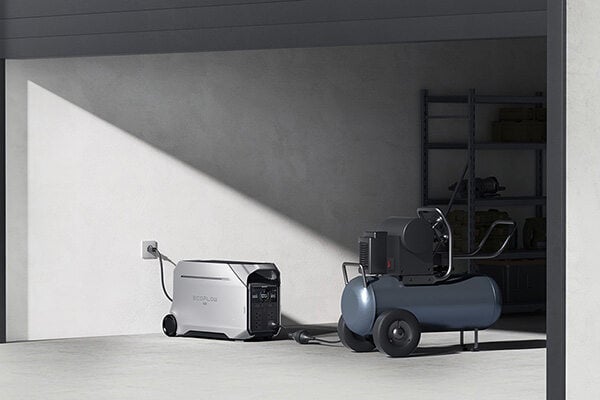In the age of rising energy uncertainty, having a backup system that blends autonomy, portability, and smart control isn’t just a luxury — it’s peace of mind. Over the past few months, I’ve been testing the EcoFlow Delta 3 Pro as my personal energy buffer. I pair it with a small balcony-mounted PV panel system and occasionally with a traditional generator, mostly during clouded days or longer outages.
What started as a curiosity quickly turned into a core part of my home energy strategy.
Why I Chose the Delta 3 Pro
There are dozens of power stations on the market, but few hit the sweet spot like the Delta 3 Pro. I was looking for:

- High capacity (4096Wh with expansion options (but up to 12kWh)
- High momentary power (4kW, and 8kW peak!)
- AC output for home appliances (let’s face it we’re here for those)
- Hybrid charging support (solar + AC + generator)
- And critically — smart power management via app integration and cloud integration
EcoFlow’s ecosystem is mature, and their Delta Pro line felt ready for both serious backup needs and experimental tinkering with solar.
Daily Usage Pattern
Primary role: Emergency buffer
The Delta sits quietly on standby 95% of the time. But it’s always charging from the outlet the day. When not in use, it serves as a power sink — storing excess energy generated when the grid doesn’t need it or when I’m not home.
When we experience a short blackout, or planned outage of power. A quick toggle, and I’m running essentials: the fridge, router, internet modem, work laptop, and a couple of LED lights — effortlessly and silently, really silently.
Hybrid mode with generator
On particularly bad weather stretches, I plug in a compact gasoline generator.I did that literally two times, one – as test, one when i needed to top it up when solar gave me stable 50W, instead of 200W. I can top up the Delta within 2–2.5 hours from the generator while it continues supplying power to the house.
This means less runtime for the generator (and less noise), since the Delta handles load balancing and surge protection.
Why this important? Because if you would buy cheap gas generator, you can top up whole device in even 1.3 – 4h, depending on power of the generator. And then use it whenever you want, including night.
Solar Integration on a Balcony? Yes, It Works.
I’m not using a massive rooftop array — just two foldable 200W panels mounted on balcony railings. It’s minimal, yes, but surprisingly effective when paired with Delta’s MPPT controller.
In clear summer skies, I consistently pull 350–400W around noon, which can give me a solid 2–3kWh per day — almost enough to fully top off the Delta from empty if I’m conservative with power use.
Also worth mentioning: EcoFlow supports smart charging schedules, so I can prioritize solar or off-peak hours when connected to the grid.
Unexpected scenario
In my workshop, i had a 6A fuse – i literally couldn’t use my shop vacuum cleaner as it’s more than 2kW on spin-up, also every time i wanted to use my table saw (2800W) my fuses just popped. Putting Delta 3 between the AC outlet and the power-hungry device just solved the issue. As I’m not using the saw for 1h straight, i can use devices that exceed my fuse even 2-4 times without a hassle 🙂 Unexpected but cool!
Real-World Runtime
Here’s what I’ve managed to power, roughly speaking:
Device Power Draw Runtime on Delta 3 Pro (4096W)
| Setup | power [W] | Amount of time on full Delta 3 Pro [h] |
| WiFi Router + ONT | 20 | 205 |
| Laptop + Monitor | 80 | 51 |
| Fridge | 100 | 41 |
| Electric kettle | 1800 | 2.3h (or more than 40 uses) |
It handles surges well (up to 8000W peak) — I’ve boiled water and run a microwave at different times without tripping anything.
What I Like Most
Intelligent Battery Management
The app is not just a gimmick — it lets me monitor input/output flows in real time, adjust charging behavior, and even trigger remote power downs. It’s reliable and has saved me more than once when I was away and forgot to switch something off. If it’s not zombie apocalypse, you have wifi – you can enjoy fully remote operations of the device, but at close range – you can just use Bluetooth.
Expandability
I haven’t bought the additional battery pack (yet), but it’s on my radar. The idea that I can go from 4kWh to over 12kWh by snapping on more modules is compelling for long-term off-grid experiments.
Quiet operation
This is a massive plus for urban use. Unlike a generator, the Delta 3 Pro runs silently, making it usable at night or in apartments without disturbing neighbors.
What Could Be Improved
Weight. At ~51 kg, it’s not exactly mobile. It has wheels and handles the are AMAZING, but uneven terrain, stairs, or even putting it in the trunk – that can be challenging, really challenging (as the device will not survive being dropped without damage).
Integration. App is great. Love it. But the fact that this device still doesn’t have good integration towards Home Assistant, because of complete change in API seem ridiculous. Help guys out!
Price. It’s a significant investment — especially if you want the full ecosystem (extra battery, solar input, etc.). But as backup infrastructure, that is portable, it’s worth it. If you’re thinking about something that will be in same place for next 5 years, choose differently.
Final Thoughts
The EcoFlow Delta 3 Pro has become my silent hero — bridging the gap between full-grid independence and practical daily resilience. It gives me control, visibility, and peace of mind. Whether it’s a storm knocking out the grid or just me wanting to boil water using balcony sunshine, this thing delivers.
It’s not perfect, but it’s smart, dependable, and future-proof. If you’re serious about integrating solar into your life or just want a robust backup without the hassle of noisy generators — this is one of the best options out there.
Verdict: 9/10
Powerful, quiet, and smart. If you need portability, or using it in the flat. Not cheap, but worth every penny.



